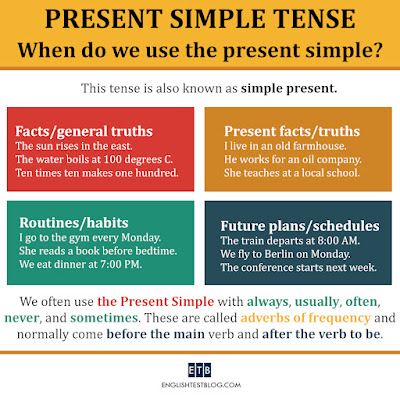The Present Simple Tense (also known as Simple Present) is used to talk about regular or permanent activities and situations. It is one of the most commonly used tenses in English.
FormationTo form the present simple, use the base form of the verb for all persons except third person singular. Third person singular is formed by adding s or es to the base form.
Negative form: Subject + do (or does) + not + base form of the verb.
Use
Positive form: Subject + base form of the verb.
Examples:
- I play
- You play
- He plays
- She plays
- It plays
- We play
- You play
- They play
👉 Click here for the spelling rules for he, she, and it
To form the negative of the present simple, add the auxiliary verb do (or does in the third person singular) and not after the subject of the sentence.Negative form: Subject + do (or does) + not + base form of the verb.
Examples:
- I do not play
- You do not play
- He does not play.
- She does not play
- It does not play
- We do not play
- You do not play
- They do not play
Remember, do not and does not can be shortened to don't and doesn't.
- I/You/We/ They don't play.
- He/She/It doesn't play.
To form questions in the present simple, use the auxiliary verb do (or does in the third person singular) before the subject of the sentence.
Question form: Do (Does) + subject + base form of the verb?
Example:
- Do I play?
- Do you play?
- Does he play?
- Does she play?
- Does it play?
- Do we play?
- Do you play?
- Do they play?
We use the Present Simple Tense to talk about:
- Facts and general truths
- Present facts and truths
- Routines and habits
- Future plans and schedules
Facts and general truths
We use the present simple to talk about facts, general truths, or things that always happen.
- The sun rises in the east.
- The water boils at 100 degrees Celsius.
- Ten times ten makes one hundred.
Present facts and truths
We use the present simple to talk about things that are true in the present.
- I live in an old farmhouse.
- He works for an oil company.
- She teaches at a local school.
Routines and habits
When we want to talk about things we do regularly or habits we have, we use the present simple.
- I go to the gym every Monday.
- She reads a book before bedtime.
- We eat dinner at 7:00 PM.
Future plans and schedules
We can use the present simple to talk about events or actions that are scheduled to happen in the future.
- The train departs at 8:00 AM.
- We fly to Berlin on Monday.
- The conference starts next week.
Time expressions
We often use the Present Simple with always, usually, often, never, and sometimes. These are called adverbs of frequency and normally come before the main verb and after the verb to be.
- My parents always support my decisions.
- They often travel to different countries.
- She sometimes cooks dinner for the family.
Common mistakes to avoid
Remember to add s or es to the third person singular form of the verb.
- She walks to school.
Some verbs undergo spelling changes when forming the third person singular.
- He goes to work early.
Use do not (don't) or does not (doesn't) to form negative sentences.
- She does not like ice cream.


Comments
Post a Comment